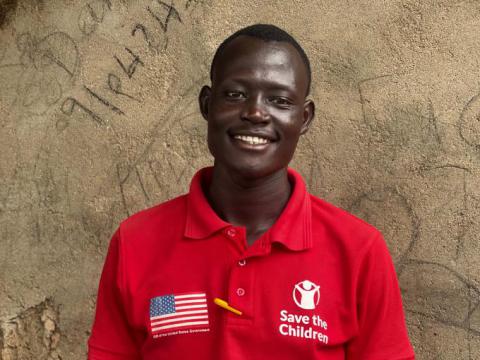From a trainee to a trainer: Yohanas, 24, finds a new life through Save the Children’s economic empowering program

Yohanas, 24, in Maban, South Sudan. Photo: Tito Justin / Save the Children
MABAN: Yohanas, 24, has 2 sisters and 2 brothers. He lives with his parents in Maban County, Upper Nile State. Maban is one of the marginalised counties in South Sudan where the host community and refugee children and young people face the risk of violence, abuse and exploitation. Poverty, separation from family, early marriage, and psychological distress persist in Maban. Children are exposed to hard labour, distress and conflict. There is low school enrolment and attendance, especially in upper classes.
None of Yohanas’ family members went to school. As an elder son, Yohanas has almost dropped out of school. In 2021, Save the Children, with funding from the Bureau for Humanitarian Assistance (USAID), trained Yohanas, among other youths in Maban, on tailoring. The project targets Yohanas among vulnerable adolescents (female and male) in the community identified through a case management system set up by Save the Children, UNHCR and other partners, including community leaders.
After six months, Yohanas graduated. Save the Children gave him start-up kits to start a business. Yohanas then has a business and works after school and over the weekend. He used the money he earned from his business to pay his tuition fees and provide scholastic materials for him and his siblings.
In 2023, Yohanas completed his secondary school and so continued to work to provide support to his younger siblings to remain in school as well as food for the family. Because of his hard work, Yohanas now works for Save the Children as a trainer. He plans to enroll in the university once he gets his results.
“It’s because of the training provided by Save the Children and the little education that I have, making me to support myself and my family. My message to the youths in Maban is to go to school because there is no life without education,” Yohanas has said.
Over the years until May 2024, Save the Children has provided tailoring training to 490 (75 male, 415 female) trainees. After graduation, all the graduates received a dressmaking start-up kit comprising of a sewing machine, a roll of fabric, threads, a pair of scissors, measuring tapes and lubricating oil, plastic sheets, plastic tables, and plastic chairs to enable them to start applying their skills and generate income for their subsistence.
Yohanas’ story in his own words
“I am a resident of Maban here. Neither of my parents nor my brothers or sisters have gone to school; as a result, they’re not working. As you have seen in Maban, agriculture is not doing well. Sometimes, floods disturb crops and sometimes, drought and sometimes conflict. Life at home has been difficult. After I joined my secondary school, I was about to drop out of school. However, I got an opportunity to be trained by Save the Children as a tailor.
Unemployment is one of the issues facing youths in Maban. I was trained by Save the Children in 2021 for six months. They then gave me sewing machines and some other start-up kits to start my business. As a student, I do come and work after work after school and over the weekends (Saturday and Sunday).
The money I get helped me to pay school fees and I completed my secondary school in 2023. At our home, it’s now the work that I do that helps my family. I now use the money to support my 2 brothers and 2 sisters in school.
After completing my secondary school, I now work for Save the Children as a trainer. I call for Save the Children or any other humanitarian organisation to establish more skills training, such as computer training, to empower youths since most work needs computer knowledge. Here in Maban, there is no technical institution or university. When I receive my result, my plan is to go to the university.
It’s because of the training provided by Save the Children and the little education I have that I can support myself and my family. My message to the youths in Maban is to go to school because there is no life without education.”.
Background
The tailoring program started way back in 2016. The program aimed at providing hands-on skills to young people with specific protection needs and provided them with an opportunity to develop and support themselves and their families economically. The project is fully funded by BPRM in collaboration with UNHCR and implemented by Save the Children. The project is implemented in the four refugee camps (Kaya, Batil, Gendrassa, and Doro) and the surrounding host community.
However, limited funding from donors and overwhelming needs of the refugees as well as the host communities remain a challenge.
Written by Tito Justin / Save the Children
 South Sudan
South Sudan